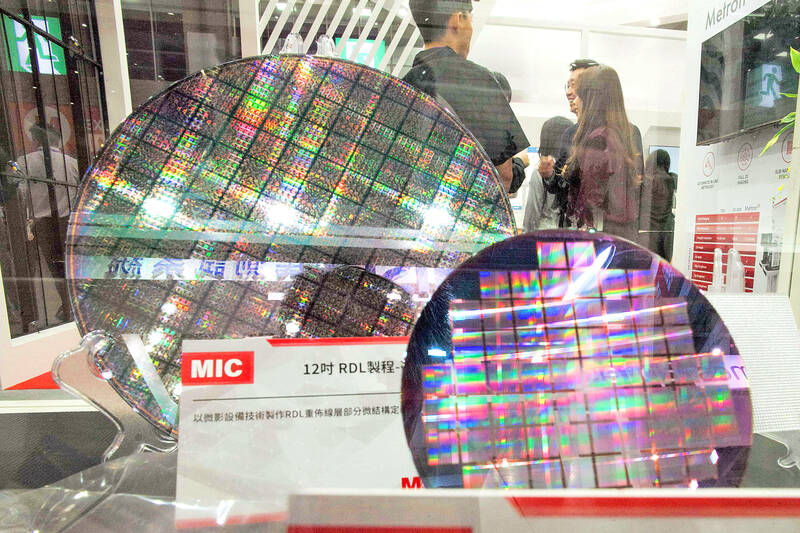Powerchip Semiconductor Manufacturing Corp (力積電) plans to launch its first artificial intelligence (AI) chips used in edge devices, cars and consumer electronics next year amid rising competition from Chinese peers, the maker of memory chips and power management chips said yesterday.
Chinese chipmakers are refocusing on less-advanced technologies due to the US government’s export curbs on advanced equipment, material and technology, Powerchip chairman Frank Huang (黃崇仁) told reporters during the Semicon Taiwan trade fair in Taipei.
“Taiwanese chipmakers have to be innovative if they want to compete with Chinese firms, which are good at price competition,” Huang said. “For Powerchip, we are planning to upgrade most of our capacity to AI and new types of memory chips, or power management chips from 2025.”

Photo: AFP
The company plans to release its new “AI computer” chips next year, made on 28-nanometer technology, Huang said, adding that the chips are different from the pricey products developed by Nvidia Corp for data centers.
“Our AI chips will be affordable and can be used in a wide range of products including edge devices and consumer electronics,” Huang said.
Taiwanese chipmakers should think about how to produce “low-cost AI chips” for average cars, in addition to chips for luxurious vehicles, he said.

Photo: CNA
The company plans to scale back display drive integrated circuit (DDIC) production to avoid direct competition with Chinese chipmakers including Semiconductor Manufacturing International Corp (中芯), China’s biggest chipmaker, Huang said.
Chinese chipmakers are allocating advanced chip-manufacturing capacity for the production of less advanced chips such as DDICs in the wake of US semiconductor bans, he said.
Chinese firms also have the upper hand in segments that require standardization or mature technologies, given China’s large-scale domestic market, their deep pockets and aggressive pricing strategy, he said.
Huang, who doubles as chairman of the Taiwan Advanced Automotive Technology Development Association, also pointed out the importance of enhancing Taiwan’s competitive edge in automotive electronics.“
“AI is definitely the future of the car industry. We believe Taiwan owns the core technologies to supply components for AI applications,” Huang said.
National Development Council Minister Kung Ming-hsin (龔明鑫) agreed, saying at the forum that Taiwanese chipmakers play a crucial role in global auto electrification given their strong capabilities, not to mention the massive business opportunity it could provide.
Revenue of automotive semiconductors would expand to US$250 billion next year, replacing wireless communication semiconductors as the biggest semiconductor segment, Kung said, citing KPMG’s projection.
A car would be equipped with more than 2,000 chips in the future, whereas current models have about 200 to 300 chips, he said, referring to a forecast by the Automotive Research and Testing Center.

Semiconductor shares in China surged yesterday after Reuters reported the US had ordered chipmaking giant Taiwan Semiconductor Manufacturing Co (TSMC, 台積電) to halt shipments of advanced chips to Chinese customers, which investors believe could accelerate Beijing’s self-reliance efforts. TSMC yesterday started to suspend shipments of certain sophisticated chips to some Chinese clients after receiving a letter from the US Department of Commerce imposing export restrictions on those products, Reuters reported on Sunday, citing an unnamed source. The US imposed export restrictions on TSMC’s 7-nanometer or more advanced designs, Reuters reported. Investors figured that would encourage authorities to support China’s industry and bought shares

TECH WAR CONTINUES: The suspension of TSMC AI chips and GPUs would be a heavy blow to China’s chip designers and would affect its competitive edge Taiwan Semiconductor Manufacturing Co (TSMC, 台積電), the world’s biggest contract chipmaker, is reportedly to halt supply of artificial intelligence (AI) chips and graphics processing units (GPUs) made on 7-nanometer or more advanced process technologies from next week in order to comply with US Department of Commerce rules. TSMC has sent e-mails to its Chinese AI customers, informing them about the suspension starting on Monday, Chinese online news outlet Ijiwei.com (愛集微) reported yesterday. The US Department of Commerce has not formally unveiled further semiconductor measures against China yet. “TSMC does not comment on market rumors. TSMC is a law-abiding company and we are

FLEXIBLE: Taiwan can develop its own ground station equipment, and has highly competitive manufacturers and suppliers with diversified production, the MOEA said The Ministry of Economic Affairs (MOEA) yesterday disputed reports that suppliers to US-based Space Exploration Technologies Corp (SpaceX) had been asked to move production out of Taiwan. Reuters had reported on Tuesday last week that Elon Musk-owned SpaceX had asked their manufacturers to produce outside of Taiwan given geopolitical risks and that at least one Taiwanese supplier had been pushed to relocate production to Vietnam. SpaceX’s requests place a renewed focus on the contentious relationship Musk has had with Taiwan, especially after he said last year that Taiwan is an “integral part” of China, sparking sharp criticism from Taiwanese authorities. The ministry said

US President Joe Biden’s administration is racing to complete CHIPS and Science Act agreements with companies such as Intel Corp and Samsung Electronics Co, aiming to shore up one of its signature initiatives before US president-elect Donald Trump enters the White House. The US Department of Commerce has allocated more than 90 percent of the US$39 billion in grants under the act, a landmark law enacted in 2022 designed to rebuild the domestic chip industry. However, the agency has only announced one binding agreement so far. The next two months would prove critical for more than 20 companies still in the process